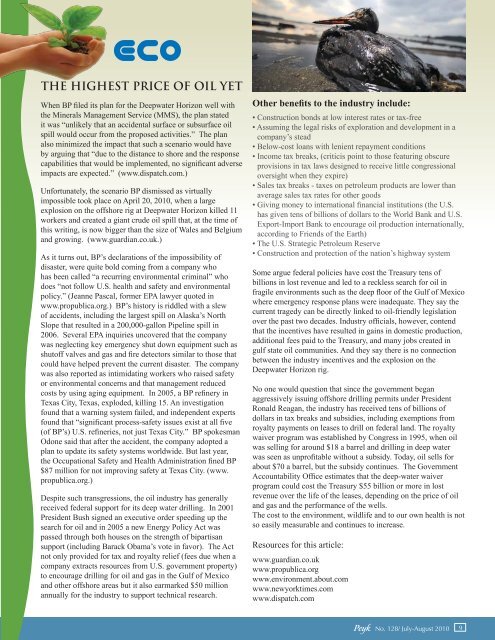English Section - Persian Cultural Center
English Section - Persian Cultural Center
English Section - Persian Cultural Center
Create successful ePaper yourself
Turn your PDF publications into a flip-book with our unique Google optimized e-Paper software.
ECO<br />
THE HIGHEST PRICE OF OIL YET<br />
When BP filed its plan for the Deepwater Horizon well with<br />
the Minerals Management Service (MMS), the plan stated<br />
it was “unlikely that an accidental surface or subsurface oil<br />
spill would occur from the proposed activities.” The plan<br />
also minimized the impact that such a scenario would have<br />
by arguing that “due to the distance to shore and the response<br />
capabilities that would be implemented, no significant adverse<br />
impacts are expected.” (www.dispatch.com.)<br />
Unfortunately, the scenario BP dismissed as virtually<br />
impossible took place on April 20, 2010, when a large<br />
explosion on the offshore rig at Deepwater Horizon killed 11<br />
workers and created a giant crude oil spill that, at the time of<br />
this writing, is now bigger than the size of Wales and Belgium<br />
and growing. (www.guardian.co.uk.)<br />
As it turns out, BP’s declarations of the impossibility of<br />
disaster, were quite bold coming from a company who<br />
has been called “a recurring environmental criminal” who<br />
does “not follow U.S. health and safety and environmental<br />
policy.” (Jeanne Pascal, former EPA lawyer quoted in<br />
www.propublica.org.) BP’s history is riddled with a slew<br />
of accidents, including the largest spill on Alaska’s North<br />
Slope that resulted in a 200,000-gallon Pipeline spill in<br />
2006. Several EPA inquiries uncovered that the company<br />
was neglecting key emergency shut down equipment such as<br />
shutoff valves and gas and fire detectors similar to those that<br />
could have helped prevent the current disaster. The company<br />
was also reported as intimidating workers who raised safety<br />
or environmental concerns and that management reduced<br />
costs by using aging equipment. In 2005, a BP refinery in<br />
Texas City, Texas, exploded, killing 15. An investigation<br />
found that a warning system failed, and independent experts<br />
found that “significant process-safety issues exist at all five<br />
(of BP’s) U.S. refineries, not just Texas City.” BP spokesman<br />
Odone said that after the accident, the company adopted a<br />
plan to update its safety systems worldwide. But last year,<br />
the Occupational Safety and Health Administration fined BP<br />
$87 million for not improving safety at Texas City. (www.<br />
propublica.org.)<br />
Despite such transgressions, the oil industry has generally<br />
received federal support for its deep water drilling. In 2001<br />
President Bush signed an executive order speeding up the<br />
search for oil and in 2005 a new Energy Policy Act was<br />
passed through both houses on the strength of bipartisan<br />
support (including Barack Obama’s vote in favor). The Act<br />
not only provided for tax and royalty relief (fees due when a<br />
company extracts resources from U.S. government property)<br />
to encourage drilling for oil and gas in the Gulf of Mexico<br />
and other offshore areas but it also earmarked $50 million<br />
annually for the industry to support technical research.<br />
Other benefits to the industry include:<br />
• Construction bonds at low interest rates or tax-free<br />
• Assuming the legal risks of exploration and development in a<br />
company’s stead<br />
• Below-cost loans with lenient repayment conditions<br />
• Income tax breaks, (criticis point to those featuring obscure<br />
provisions in tax laws designed to receive little congressional<br />
oversight when they expire)<br />
• Sales tax breaks - taxes on petroleum products are lower than<br />
average sales tax rates for other goods<br />
• Giving money to international financial institutions (the U.S.<br />
has given tens of billions of dollars to the World Bank and U.S.<br />
Export-Import Bank to encourage oil production internationally,<br />
according to Friends of the Earth)<br />
• The U.S. Strategic Petroleum Reserve<br />
• Construction and protection of the nation’s highway system<br />
Some argue federal policies have cost the Treasury tens of<br />
billions in lost revenue and led to a reckless search for oil in<br />
fragile environments such as the deep floor of the Gulf of Mexico<br />
where emergency response plans were inadequate. They say the<br />
current tragedy can be directly linked to oil-friendly legislation<br />
over the past two decades. Industry officials, however, contend<br />
that the incentives have resulted in gains in domestic production,<br />
additional fees paid to the Treasury, and many jobs created in<br />
gulf state oil communities. And they say there is no connection<br />
between the industry incentives and the explosion on the<br />
Deepwater Horizon rig.<br />
No one would question that since the government began<br />
aggressively issuing offshore drilling permits under President<br />
Ronald Reagan, the industry has received tens of billions of<br />
dollars in tax breaks and subsidies, including exemptions from<br />
royalty payments on leases to drill on federal land. The royalty<br />
waiver program was established by Congress in 1995, when oil<br />
was selling for around $18 a barrel and drilling in deep water<br />
was seen as unprofitable without a subsidy. Today, oil sells for<br />
about $70 a barrel, but the subsidy continues. The Government<br />
Accountability Office estimates that the deep-water waiver<br />
program could cost the Treasury $55 billion or more in lost<br />
revenue over the life of the leases, depending on the price of oil<br />
and gas and the performance of the wells.<br />
The cost to the environment, wildlife and to our own health is not<br />
so easily measurable and continues to increase.<br />
Resources for this article:<br />
www.guardian.co.uk<br />
www.propublica.org<br />
www.environment.about.com<br />
www.newyorktimes.com<br />
www.dispatch.com<br />
No. 128/ July-August 2010 9

















